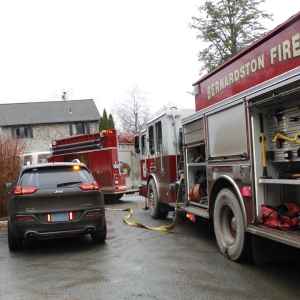My Turn: Invest in hunger-free campuses to make free college truly work

The lobby of Greenfield Community College, where the writer is attending through MassReconnect, which provides free tuition for those over 25 without degrees. STAFF FILE PHOTO/PAUL FRANZ
| Published: 04-04-2025 1:22 PM |
After years of working as a custodian and dishwasher, I returned to school at the age of 42 through the MassReconnect program. I’m a first-generation student — no one in my immediate family had ever completed a degree. College was never an expectation for me, not even in my own mind.
But when I was afforded the opportunity to go to college without the looming fear of debt and failure, it gave me the chance to see myself in a different light. Greenfield Community College has changed my life. It’s given me a new sense of who I am, a commitment to service work and bettering my community, and the ambition to move on to a four-year institution.
This past year, MassReconnect was expanded to students of all ages. In my second year at GCC, I’ve seen so many others — people who never thought college could be an option — take that first step at one of our western Massachusetts community colleges. The energy that comes from being part of a college community can be life-changing. I’ve experienced it firsthand.
But the harsh reality is that just getting students in the door isn’t enough.
So many of us are struggling with the cost of living. Even with free tuition, many still can’t afford to be full-time students and support themselves or their families at the same time. Enrollment means very little if students aren’t supported through to graduation. Retention is what counts and retention requires meeting students’ basic needs.
Massachusetts’ investment in free community college is a long-overdue move that will pay off for first-generation and low-income students across the state. It has the power to create generational change. But if we want that investment to succeed, we need to provide support that goes beyond tuition. At four-year colleges, housing and meal plans are often covered through financial aid. Community colleges, by contrast, lack the resources to support students at that same level.
That’s where the Hunger-Free Campus Initiative comes in.
Article continues after...
Yesterday's Most Read Articles
 Two dogs, three cats killed in Orange fire
Two dogs, three cats killed in Orange fire
 Leyden house fire reignites on Monday
Leyden house fire reignites on Monday
 PHOTOS: Hundreds participate in ‘Hands Off!’ standouts across Franklin County
PHOTOS: Hundreds participate in ‘Hands Off!’ standouts across Franklin County
 Plans to move Northfield EMS to Bernardston property fall through
Plans to move Northfield EMS to Bernardston property fall through
 Shelburne Selectboard determines police detective will retain job
Shelburne Selectboard determines police detective will retain job
 Bulletin Board: Greenfield's Savannah Thomas wins Knights of Columbus Hoop Shoot state title
Bulletin Board: Greenfield's Savannah Thomas wins Knights of Columbus Hoop Shoot state title
This initiative, developed and championed by students like me, asks the state to invest $2 million in the coming budget to support food pantries at public colleges and universities across the state. Right now, 44% of public university and community college students in Massachusetts face food insecurity. That number is staggering, and it’s even higher in places like Franklin County where poverty rates exceed the state average.
At GCC, our campus food pantry is consistently packed. It’s one of the only reasons some students are able to stay in school. It’s not just handing out snacks — it’s providing stability and hope. When a student knows they can grab a few groceries or a meal, they can focus on class instead of whether they’ll eat that day.
Food insecurity is a deep-rooted issue. It takes layered policies to address it. Making community college tuition-free is a critical first step, but it has also opened the doors for more students who are already dealing with housing instability, hunger, and poverty. We cannot stop at access alone. We need to build out the supports that allow students to succeed once they’re enrolled.
Without action at the state level to fund our pantries and address basic needs, the progress we’ve made through free college could be undermined by federal cuts to SNAP and other safety net programs.
Free community college is not a handout. It’s an investment in all of our futures. The students we’re supporting today are tomorrow’s health care workers, teachers, law enforcement officers, and public servants. We need to nourish them now so they can be empowered to serve us all later.
I urge lawmakers to support the Hunger-Free Campus Initiative and place $2 million in the state budget to fund food security services at our public colleges and universities. Giving students access without support sets them up to fail. If we want success, we have to fund it.
Mike Hannigan is president of the Greenfield Community College Student Senate and president of the Permaculture Club.






 My Turn: ADUs and the politics of fear
My Turn: ADUs and the politics of fear My Turn: The war on us has begun
My Turn: The war on us has begun Jon Oltman: And the takeaway is?
Jon Oltman: And the takeaway is? Edward Schwerin: Trump regime not the answer
Edward Schwerin: Trump regime not the answer
